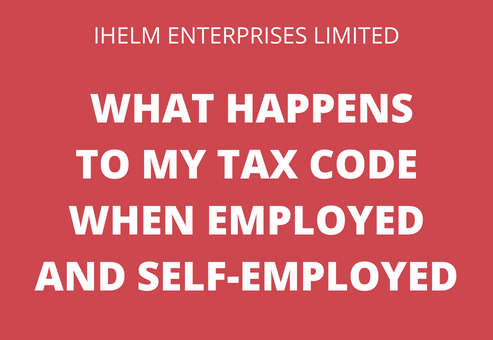During this month’s Facebook Live, I talked about what happens to your tax code if you are employed and decide to set up a small business of your own and become self-employed.
A lot of people have self-employed businesses but are also employed, and they worry about what that means for their tax code. They also wonder whether they need to let their employer know that they have a small business of their own.
Let’s look at the tax code side of things first.
The good news is that being employed and having a self-employed business will not affect your tax code that your employer uses for paying you. They will continue to pay tax on your behalf to HMRC based on the tax code HMRC provide to them as an employee.
However, at the end of the tax year when you file your tax return, the money you have made from your employment, plus the money you have made from your self-employed business, will be added together to see if you have gone over the personal tax threshold. Currently, this is £12,570 and it will stay that way until 2028. HMRC will also add in any additional income you may have – rental income, income from shares, pension income/contributions, interest received on savings etc.
If you have gone over the threshold, HMRC will take into consideration the amount of tax you have already paid through your employment, and you will then have to pay any remaining amount to them. The information from your employment should already be entered into the tax return with HMRC, but you will be able to check this against your P60 that your employer provides to you.
The tax rates for the 2022/2023 tax year are as follows:
- Basic Rate which is 20% and charged on income between £12,571 and £37.700 for England, Northern Ireland, and Wales
- Higher Rate which is 40% and charged on income between £37,701 and £150,000 for England, Northern Ireland, and Wales
- Additional Rate which is 45% on all income over £150,000 for England, Northern Ireland, and Wales
The rates for Scotland are different due to the different tax they pay, and you can find the information about these rates by going to the income tax rates and allowances page on the HMRC website.
The tax rates for the 2023/2024 tax year are changing slightly and from April 2023, the rates for England, Northern Ireland and Wales will be:
- Basic Rate 20% on income between £12,571 to £50,270
- Higher Rate 40% on income between £50,271 and £125,140
- Additional Rate 45% on income over £125,140
This means that more people will start to pay tax the highest tax rate sooner.
While you pay toward employee National Insurance contributions through your employment, through the self-employed business you will be liable to pay Class 2 National Insurance which is £3.15 per week for the 2022/2023 tax year and is paid on profits of more than £11,908/year, as well as Class 4 National Insurance if your profits are more than £11,909 per year. The Class 4 National Insurance rates are 9.73% on profits between £11,909 and £50,270, and 2.73% on profits over £50,270. These will be calculated for you once you complete your tax return and HMRC will let you know what you need to pay to them. You can read more about the National Insurance a self-employed business has to pay by going to the page on the HMRC website.
What about whether you need to tell your employer that you have a small business of your own?
There is no law that states you must tell your employer if you set up a self-employed business on your own.
However, it is advisable that you read through your employment contract to make sure that you are not in any way in breach of that contract. Your employer may have certain restrictions on things that you can do outside of work, and you want to ensure that you are not breaking your contract.
You will also want to consider whether your self-employed business will cause any issues with you working for your employer – will it mean you can’t work the hours you are contracted for; will it make it difficult for you to get the work done for your employer?
If you would like further information about being employed and having a self-employed business, please feel free to e-mail me.

